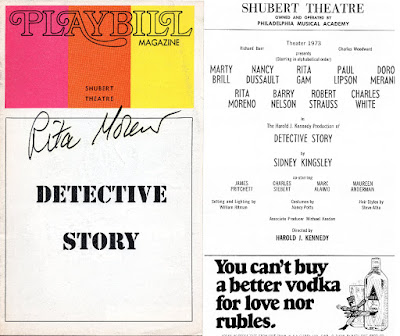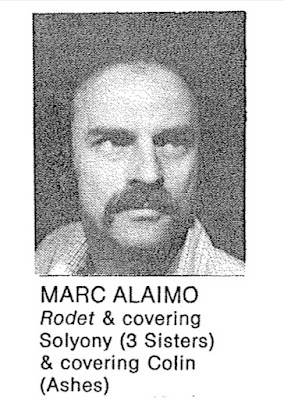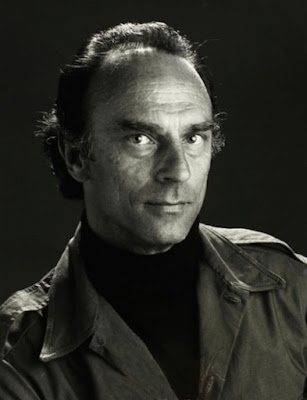Marc Alaimo - THEATRE - PART II (1973-1979)
“I remember him – good-looking, intense, with a wicked grin. He was the kind of actor you couldn't help watching, even in small or background moments.” - Susan Yankowitz, January 2021 (Playwright, “Slaughterhouse Play")
This is Part 2 of my three-part series on Marc Alaimo’s amazing theatrical career. In this post, we will focus on 1973-1979, where Marc was balancing both a successful film and television career with his first love, the stage. Click here for Part 1
“Marc is a very gifted actor. He was always focused and disciplined, and has immense energy he gives to other actors. He has played a diversity of roles and always brings a uniqueness to them.” - Elaine “E.E.” Moe, January 2021 (Founder of the Megaw Theatre)
PART 2: 1973-1979

During his run in 1973 as the villainous Virgil Paris on the soap opera Somerset, Marc had the opportunity to be part of a “pre-Broadway” play. Pre-Broadway plays are those that are “tested” with audiences in different places in and around New York City to see if they would work as an actual Broadway production. A revival of “Detective Story” opened at the Shubert Theatre (now the Merriam Theater) in Philadelphia in early spring. Marc played Charlie, one of two cat burglars, part of a massive cast of characters in this gritty police drama.
From what I’ve read in Harold J. Kennedy’s amusing book, No Pickle, No Performance, the show was unfortunately doomed from the start. Burdened with a quirky actress and many cast overhauls, ”Detective Story” sadly never made it to Broadway. I do hope it was still a good (bearable?) experience for Marc. His glowing reviews prove he was the highlight of the play:
“Marc Alaimo as a burglary suspect steals several scenes with a fine portrayal.” - Philip F. Crosland, News Journal, Mar 17, 1973
“Best of all is Marc Alaimo as the cat burglar; he brings the stage to life whenever he has an active part in the play.” - Otto Dekom, Morning News, Mar 13, 1973
“Comedy is provided by a pair of burglars (Marc Alaimo and Philip Larson). Alaimo is particularly good, with his obstinancy.” - Barbara D’Arienzo, Herald-News, Feb 19, 1973
With the untimely demise of his character, Virgil Paris, on Somerset, Marc decided to pull up stakes and move his family (and his beloved Chrysler 300E) from New York to Los Angeles at the end of 1973.
Late 1974 saw Marc join the Megaw, a delightfully intimate 99-seat theatre in Northridge, California. I had the great honor of speaking with one of its founders, Elaine “E.E.” Moe earlier this year. Elaine and her partner Sydney May Morrison took a converted Baptist church and transformed it into a thriving cultural hub, offering everything from theatrical performances to art and movement classes. The Megaw constantly had sold out shows and a loyal subscription base until the theatre shuttered in 1987. Elaine is currently working as a teacher and director in Arizona and has won numerous awards, including the Kennedy Center American College Theatre Festival Gold Medallion of Excellence in Arts and Education, the Bridge Initiative Women in Theatre Leader of the Year and National Society of Arts & Letters Education in the Arts, and an ariZONI Award for directing “Calendar Girls” at the Phoenix Theatre Company. She was an absolute delight to chat with and I am very grateful for her insights.
Marc’s first play with the Megaw would see him reprise his role as Horace Giddens in “The Little Foxes” that he originally performed with the Theater Centre of Mississippi in 1970. He replaced another actor at the last minute and was able to step into the role effortlessly. Elaine related: “Marc was really magical. Given such short notice, I knew Marc could bring Horace to life like no one else could. He captured this role with a disturbing and surprising empathy.”
“Marc Alaimo arouses due compassion as Regina’s cardiac husband, Horace, and handles his heart attack–always a difficult stage task–with admirable realism and restraint.” - Sylvie Drake, Los Angeles Times, Oct 2, 1974
“Another fine performance was delivered by Marc Alaimo as Horace Giddens. Playing a man with a serious heart condition, he was very believable. The audience watched him slowly deteriorate due to the activities of his wife and her brothers, until finally he suffered a heart attack. This scene was an especially convincing piece of acting. The audience was left somewhat numbed as they watched him gasp for his last breath.” - Andrea Merton, Los Angeles Daily Sundial, Oct 4, 1974
“Marc’s directing was specific regarding period style and very engaging pictorially in storytelling. He had an eye for detail.” - Elaine Moe, founder of the Megaw, February 2021
In 1975, Marc continued at the Megaw Theatre, playing the lead role of Jimmy Porter in “Look Back in Anger.” His performance garnered rave reviews and was a hit with audiences.
Elaine Moe, director of the play, told me:
“There wasn’t anybody else in my heart or mind that I wanted for the role of Jimmy.”
“Marc Alaimo is a firebrand Jimmy, all jangled wires and twisted nerves. He is at once attractive, repellent and irresistible.” - Sylvie Drake, Los Angeles Times, Mar 6, 1975
“Marc Alaimo is brightly articulate as Jimmy, saturnine yet whimsical enough to keep us from getting angry at his relentless anger.” - Charles Faber, Los Angeles Free Press, Mar 14, 1975
In the spring of 1976, Marc joined the repertory company of the Mark Taper Forum in Los Angeles for a season. He was featured in Chekhov’s “Three Sisters” as the soldier Rodet (and understudied for, and eventually replaced another actor as, Solyony, a role he had originally played at MRT in 1969) as well as covering the role of Colin in the play, “Ashes.”
At a 1996 Q&A session, Marc related that his time at the Taper was “not a very pretty one” and he felt very underappreciated there. Personally, I thought it was strange that he was playing such a small role (Rodet) when he had already played Solyony to great acclaim earlier in his career.
From 1977 into 1978, he worked steadily in movies and on television, then returned to the Megaw Theatre for a production of the musical, “Carnival,” playing mischievous magician, Marco. Elaine Moe related that she “loved having Marc in this musical. He brought an edgy, exciting challenge to the role and was an absolute delight as Marco.” Although Marc didn’t get the chance to sing and dance, “his entire body was always fluid and in command with the nature of the character.”
“[The] lead cast is excellent, with some outstanding voices for a smaller theater musical production…and Ann Walker and Marc Alaimo as Rosalie and Marco, are perfectly cast and directed.” - John C. Mahoney, Los Angeles Times, Aug 4, 1978
The Bard came calling for Marc again in 1979, as he appeared in the Los Angeles Shakespeare Festival’s production of “Twelfth Night” as the pompous steward Malvolio at the outdoor Ford Theatre. Elaine Moe also directed Marc in this production and related that: “For me, Marc is still one of the most brilliant of Malvolios. We loved doing this together. His entrance with the supposed love letter brought the house down at the John Hanson Ford Theatre.”
“Marc Alaimo’s Malvolio was polished and authoritative throughout. His reading of Maria’s letter was a show-stealing performance, capped by his “I will smile” accompanied by strenuous efforts to bring a grimace to the dour countenance that had clearly never known one.” Joseph H. Stodder, Lillian Wilds, Shakespeare Quarterly, Vol. 31, No. 2, Summer 1980
Throughout all of this, Marc was working at his “day job” as an onscreen actor. There is a definite dedication and love of the theatre to continue coming back to it, even while being so busy with film and television roles!
This concludes Part 2 of Marc’s theatrical history. Click here for Part 3 or
Very special thanks to Elaine “E.E.” Moe for her amazing insights into Marc’s time at the Megaw Theatre, Samuel L. Leiter Ph.D., Distinguished Professor Emeritus of Theatre, CUNY for help with information on “Detective Story,” the wonderful Christa at the Los Angeles Public Library for providing me with most of Marc’s Los Angeles play programs, Manuel at the Hargrove Music Library, UC Berkeley for the stunning photo of Marc from “Medea,” playwright Susan Yankowitz for her insights and wonderful quote, and the Center Theatre Group for the “Three Sisters” program.
©2020/2021 Elisa Ward










Comments
Post a Comment